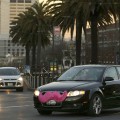
Car-sharing services are proliferating nationwide for people who need a vehicle without the high ownership price.
Younger travelers seeking to avoid long waits at airport rental counters are increasingly turning to car-sharing services as a convenient, affordable way to get around, whether it’s for weekend outings or short trips the grocery store.
Much like Uber and other transportation network companies are changing the way people hire vehicles, car-sharing services are proliferating nationwide for people who need a vehicle without the high ownership price.
By 2020, the number of car-sharing users worldwide is expected to increase to 26 million, up from 5 million in 2014, according to a principal at Frost & Sullivan, a market research company. Most of them will be drawn to the technology, environmental consciousness and convenience of cars that can be rented by the hour from a location they prefer.
To meet the growing demand, many of the top traditional car rental companies have created their own car-sharing services.
Zipcar, which was acquired by Avis in 2013, started out on college campuses and has grown into a fleet of 10,000 vehicles that can also be parked at airports or garages next to suburban train stations.
You Might Also Enjoy: Millennials More Likely to Lease Vehicles, Especially These Brands
Car2go, which is owned by Daimler, operates 5,000 two-seater Smart Fortwo cars that don’t have to be returned to their original location. Available in 10 U.S. cities, the cars rent for 41 cents a minute or $14.99 hour, making them affordable alternatives to Uber and taxis.
Zipcar offers different memberships in New York and New Jersey, but drivers have to return the car to its original spot. For customers paying a $70 annual membership, or $7 monthly fee, rates start at $9.25 an hour, depending on location and vehicle type. For customers paying $50 upfront, rates start at $8.33.
Automakers are also getting into the car-sharing business. Nissan recently partnered with Enterprise CarShare to supply vehicles to more than 90 college campuses nationwide, with the idea that people who rent a car and like it are more apt to buy one of their own.
New research by Enterprise found that more than two-thirds of millennials surveyed said they considered buying a specific car model after renting it and one-third said renting a nice ride prompted them to ditch their old car for a new one.
Partnerships are starting to extend to cities. In August, the city of Boston awarded Enterprise CarShare 40 public parking spaces in municipal lots and on city streets as part of its DriveBoston. The hope is to encourage more people to use car-sharing.





